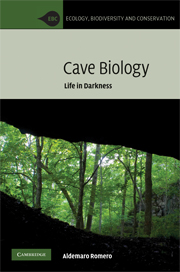Book contents
- Frontmatter
- Contents
- Preface
- Acknowledgments
- 1 A brief history of cave biology
- 2 Cave biodiversity
- 3 The evolutionary biology of cave organisms
- 4 The ecology of cave organisms
- 5 Cave conservation and management
- 6 Epilogue
- Appendix 1 Glossary of terms frequently used in biospeleology
- References
- Index
- Plate section
1 - A brief history of cave biology
Published online by Cambridge University Press: 21 October 2009
- Frontmatter
- Contents
- Preface
- Acknowledgments
- 1 A brief history of cave biology
- 2 Cave biodiversity
- 3 The evolutionary biology of cave organisms
- 4 The ecology of cave organisms
- 5 Cave conservation and management
- 6 Epilogue
- Appendix 1 Glossary of terms frequently used in biospeleology
- References
- Index
- Plate section
Summary
Some specialist books include a short introduction or brief chronology of the major historical events related to the branch of knowledge they cover. In this book there is an entire chapter on the history of biospeleological ideas. This is because it is essential to explain why biospeleology as a science in general, and our understanding of cave biology in particular, lags so far behind in mainstream organismal biology, particularly in terms of evolution and ecology. In fact, the author argues that this is so because many biospeleologists have failed to understand the historical framework in which this science has developed. This has led many to uncritically accept both concepts and lexicons that are inconsistent with current biological thought. Thus, this chapter provides a historical explanation of the ideological framework surrounding the majority of biospeleological research. This chapter also contains a number of illustrations (Figs. 1.1–1.5) related to the historical narrative presented here; more illustrations on this topic may be found in Romero (2001b).
Conceptual issues
An understanding of the history of any particular area of scientific inquiry is essential in order to really appreciate the significance of current knowledge and the voids that need to be filled. Most scientists are not particularly interested in pursuing such a task because the history of science is influenced by philosophy, politics, religion, and other expressions of human activities whose comprehension requires interdisciplinary approaches that go beyond what scientists have been normally trained for in universities.
- Type
- Chapter
- Information
- Cave BiologyLife in Darkness, pp. 1 - 61Publisher: Cambridge University PressPrint publication year: 2009

